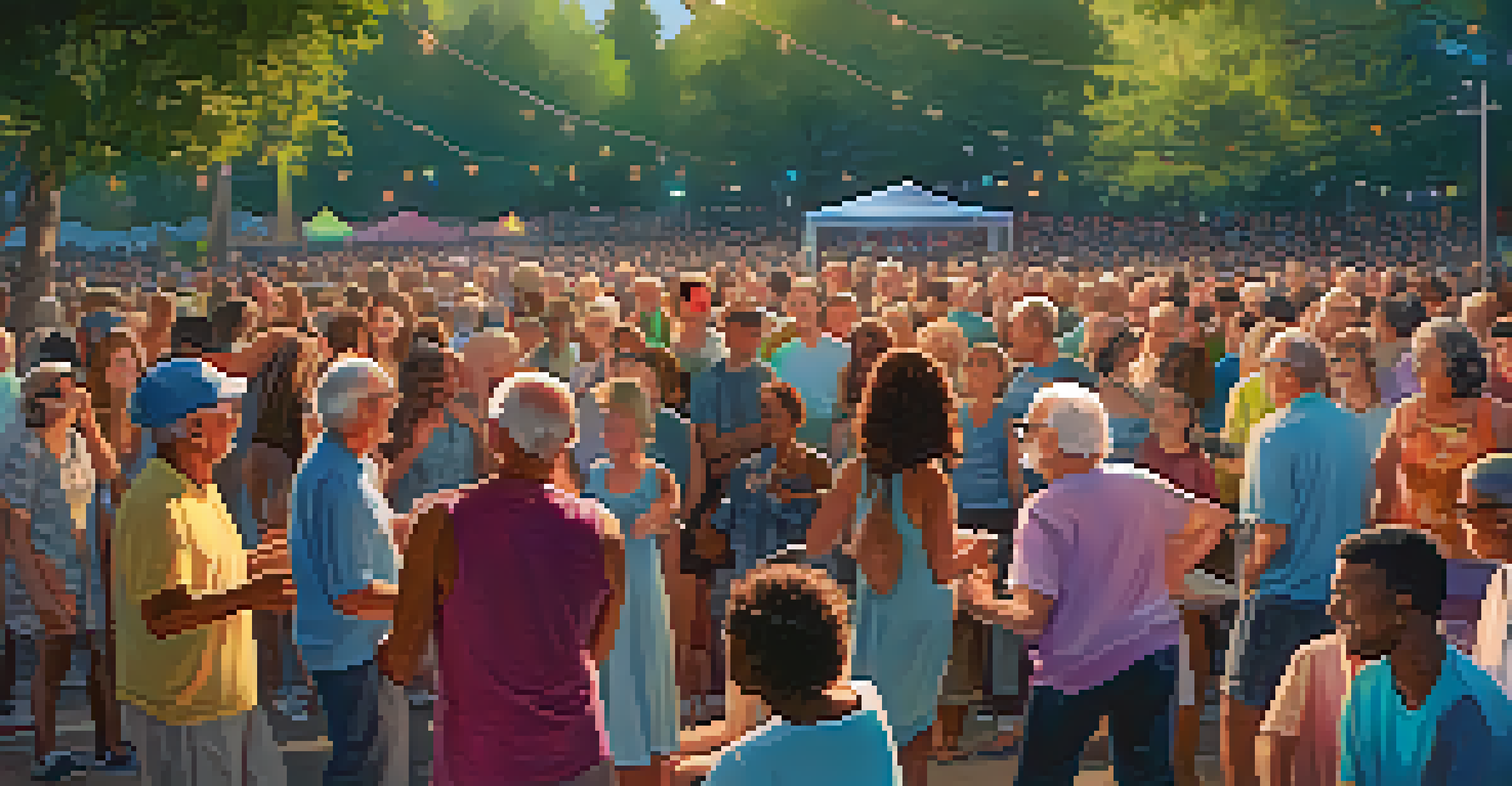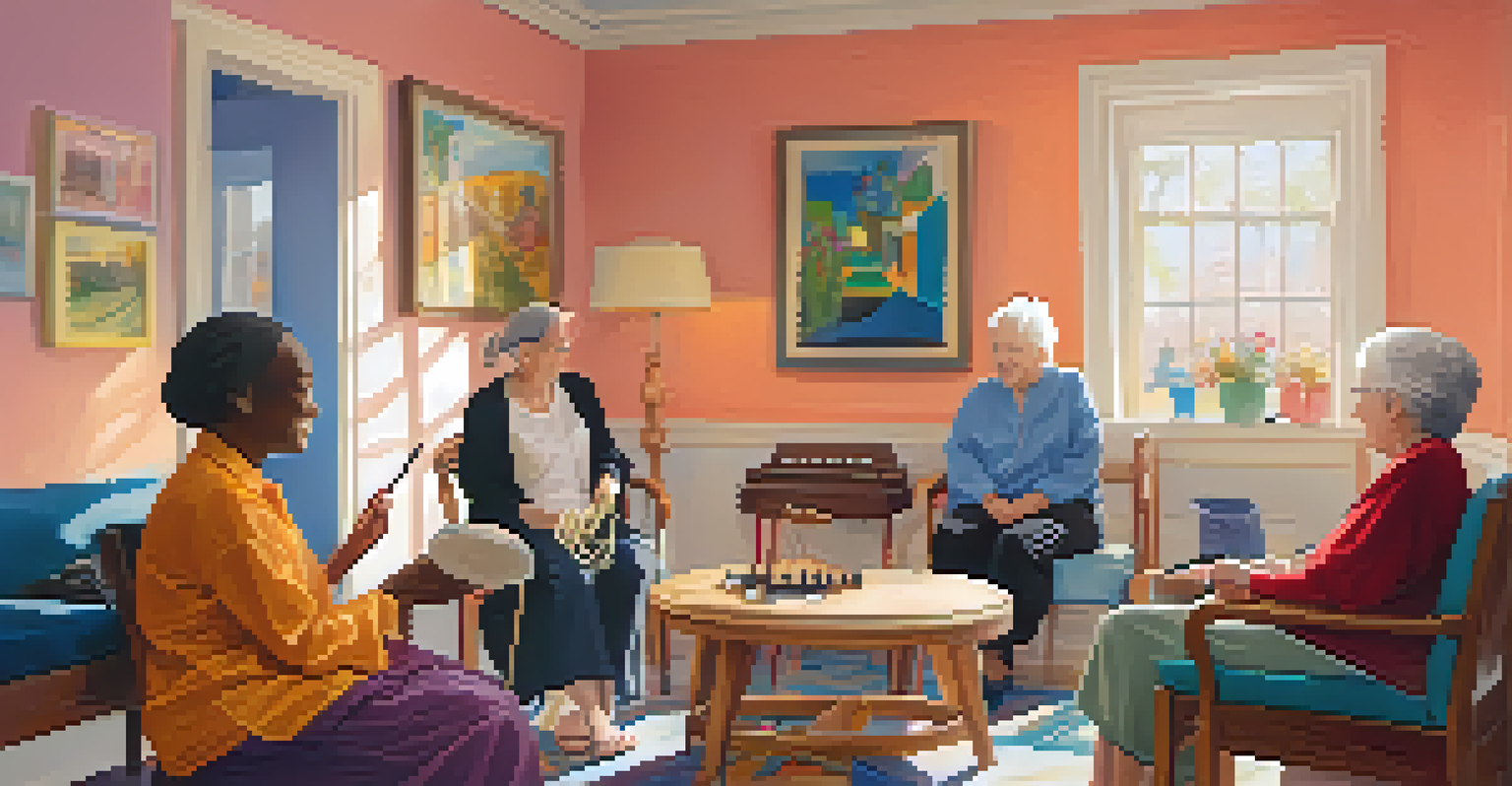The Evolution of Music Preferences in Aging Individuals

Understanding Music Preferences in Aging Individuals
Music preferences are often shaped by life experiences and cultural influences. As individuals age, these factors evolve, leading to shifts in the types of music they enjoy. For instance, someone who grew up with rock music in their youth may find themselves gravitating towards softer genres like jazz or classical as they grow older.
Music can change the world because it can change people.
Moreover, the emotional connection that music provides can change over time. Older adults may seek music that resonates with their current life stage, often favoring songs that evoke nostalgia or reflect their personal journeys. This evolution highlights how music serves not only as entertainment but also as a means of reflection and comfort.
Understanding these shifts can offer insights into the broader aspects of aging and socialization. Music acts as a bridge connecting generations, allowing older adults to share their preferences with younger family members, creating a unique bond through shared musical experiences.
The Role of Nostalgia in Music Choices
Nostalgia plays a powerful role in shaping music preferences among aging individuals. Many people find comfort in the sounds and lyrics that remind them of their youth, creating a sense of familiarity and warmth. For example, listening to songs from the 60s or 70s may evoke fond memories of carefree days, making these tunes particularly appealing.

This emotional connection can lead to a preference for 'oldies' over contemporary music. The familiarity of past hits often provides a sense of stability in a world that is constantly changing. As we age, these nostalgic tunes can create a soundtrack to our memories, reinforcing our identities and life stories.
Nostalgia Shapes Music Preferences
Aging individuals often gravitate towards music that evokes nostalgia, reflecting their life experiences and emotional connections.
Interestingly, nostalgia isn't limited to older music; modern songs that echo past styles can also resonate deeply. This blend of old and new allows aging individuals to engage with current trends while still holding onto the comfort of their musical roots.
Changing Social Dynamics and Music Tastes
As individuals age, their social circles often change, which can influence music preferences. For example, retirees may find themselves attending more social events like dances or concerts, where different genres are highlighted. This exposure can lead to new interests, expanding their musical horizons beyond what they enjoyed in their younger years.
The beautiful thing about music is that it transcends language.
Moreover, the influence of family, particularly grandchildren, can introduce aging individuals to contemporary music. This intergenerational exchange fosters an appreciation for new genres, blending tastes from both ends of the age spectrum. For instance, a grandparent might discover the appeal of pop or hip-hop through their grandchildren, creating shared experiences around music.
In essence, social dynamics play a crucial role in shaping music preferences. The interactions and relationships that evolve over time can encourage individuals to explore and embrace different musical styles, resulting in a richer and more varied listening experience.
The Impact of Technology on Music Consumption
Technology has significantly transformed how we consume music, impacting aging individuals' preferences. With the rise of streaming services, older adults have unprecedented access to vast libraries of music. This convenience allows them to explore genres and artists they may not have encountered through traditional radio or vinyl records.
Many aging individuals are becoming tech-savvy, learning to navigate platforms like Spotify or Apple Music. This newfound ability to curate personalized playlists helps them connect with both nostalgic favorites and current hits. The ease of access empowers them to discover music that resonates with their evolving tastes.
Social Dynamics Influence Tastes
Changes in social circles and interactions, particularly with family, can expand the musical interests of older adults.
Additionally, technology facilitates connections with others through shared playlists or social media. Aging individuals can engage with friends and family over musical tastes, creating a sense of community around their preferences. This interaction can enrich their listening experience and foster deeper social bonds.
Health Benefits of Music for Aging Individuals
Engaging with music has been shown to provide numerous health benefits for aging individuals. Research indicates that listening to music can enhance mood, reduce anxiety, and even improve cognitive function. These positive effects make music not just a source of enjoyment, but also a valuable tool for promoting overall well-being.
Moreover, music therapy has gained recognition for its ability to assist in managing conditions like dementia and depression. Familiar songs can trigger memories and emotions, providing comfort and helping individuals maintain a sense of identity. This therapeutic aspect of music underscores its importance in the lives of aging individuals.
As such, fostering a connection to music can be a simple yet effective way to enhance the quality of life for older adults. Encouraging them to listen to their favorite tunes or participate in music-related activities can lead to meaningful improvements in their emotional and mental health.
Personal Experiences and Musical Memories
Personal experiences often shape our music preferences, and this is particularly true for aging individuals. Many people associate specific songs with significant life events, such as weddings, graduations, or even loss. These musical memories create a rich tapestry of emotions tied to the tunes they love.
For example, a song might remind someone of their first dance with a partner or a road trip with friends. As we age, these associations become even more potent, leading to a preference for songs that evoke strong emotional responses. This connection to music can serve as a powerful reminder of cherished experiences and important milestones.
Technology Enhances Music Access
Streaming services empower aging individuals to explore new genres and connect with others through shared musical experiences.
Encouraging older adults to share their musical memories can foster deeper connections with others. It opens up opportunities for storytelling, allowing them to reflect on their past while engaging with loved ones through shared experiences and emotions.
Looking Ahead: Future Music Preferences in Aging
As society continues to evolve, so too will the music preferences of aging individuals. With each generation comes a new set of cultural influences, technology, and shared experiences that shape musical tastes. The music enjoyed by older adults today will likely differ from that of future generations, reflecting the changes in society and cultural shifts.
Furthermore, as younger generations age, their preferences may carry over into their later years, blending past and present styles. This could create a dynamic musical landscape where a diverse range of genres coexists, allowing for richer and more varied listening experiences. For instance, today's aging population might continue to embrace contemporary music alongside their beloved classics.

Ultimately, the evolution of music preferences in aging individuals will remain a fascinating aspect of cultural study. By understanding how these changes occur, we can appreciate the role music plays in shaping identities and fostering connections across generations.